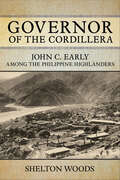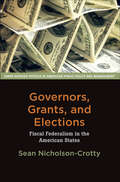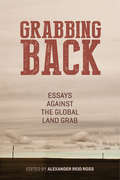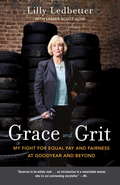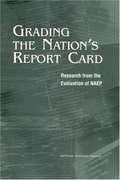- Table View
- List View
Governor Reagan His Rise To Power: His Rise To Power
by Lou CannonBased his work on interviews and access to previously unpublished material, the author of several books on Reagan casts his political career from its start in 1960s California to the successful 1980 presidential bid in terms of such roles as pragmatist, survivor, and salesman. Includes photos. Annotation (c)2003 Book News, Inc. , Portland, OR (booknews. com)
Governor of the Cordillera: John C. Early among the Philippine Highlanders (NIU Southeast Asian Series)
by Shelton WoodsGovernor of the Cordillera tells the story of an American colonial official in the Philippines who took the unpopular position of defending the rights of the Igorots, was fired in disgrace, and made a triumphal return. During the first fifteen years of colonial rule (1898–1913), a small group of Americans controlled the headhunting tribes who were wards of the nascent colonial government. These officials ignored laws, carved out fiefdoms, and brutalized (or killed) those who challenged their rule. John Early was cut from a different cloth. Battling colleagues and supervisors over their treatment of the mountain people, Early also had run-ins with lowland Filipino leaders like Manuel Quezon. Early's return as governor of the entire Cordillera was celebrated by all the tribes.In Governor of the Cordillera Shelton Woods combines biography with colonial history. He includes a discussion on the exhibition of the Igorots at the various fairs in the US and Europe, which Early tried to stop. The life of John Early is a testament to navigating political and racial divides with integrity.
Governors and the Progressive Movement
by David R. BermanGovernors and the Progressive Movement is the first comprehensive overview of the Progressive movement’s unfolding at the state level, covering every state in existence at the time through the words and actions of state governors. It explores the personalities, ideas, and activities of this period’s governors, including lesser-known but important ones who deserve far more attention than they have previously been given. During this time of greedy corporations, political bosses, corrupt legislators, and conflict along racial, class, labor/management, urban/rural, and state/local lines, debates raged over the role of government and issues involving corporate power, racism, voting rights, and gender equality—issues that still characterize American politics. Author David R. Berman describes the different roles each governor played in the unfolding of reform around these concerns in their states. He details their diverse leadership qualities, governing styles, and accomplishments, as well as the sharp regional differences in their outlooks and performance, and finds that while they were often disposed toward reform, governors held differing views on issues—and how to resolve them. Governors and the Progressive Movement examines a time of major changes in US history using relatively rare and unexplored collections of letters, newspaper articles, and government records written by and for minority group members, labor activists, and those on both the far right and far left. By analyzing the governors of the era, Berman presents an interesting perspective on the birth and implementation of controversial reforms that have acted as cornerstones for many current political issues. This book will be of interest to students and scholars of US history, political science, public policy, and administration.
Governors, Grants, and Elections: Fiscal Federalism in the American States (Johns Hopkins Studies in American Public Policy and Management)
by Sean Nicholson-CrottyHow partisan politics influence grant-related decisions at the state level.Each year, states receive hundreds of billions of dollars in grants-in-aid from the federal government. Gubernatorial success is often contingent upon the pursuit and allocation of these grants. In Governors, Grants, and Elections, Sean Nicholson-Crotty reveals the truth about how U.S. governors strategically utilize these funds. Far from spending federal money in apolitical ways, they usually pursue their own policy interests in the hopes of maximizing their or their party’s electoral success. Nicholson-Crotty analyzes three decades of data on the receipt and expenditure of grants in all fifty states. He also draws compelling evidence from governors’ public speeches and interviews with state officials. Ultimately, he demonstrates that incumbent governors’ use of grants to deliver policies desired by core constituents—along with their opportunistic funding of public and private goods that appeal to noncore median voters—enables them to increase approval, legislative success, and, ultimately, vote share for themselves or their parties.The inaugural book in the Johns Hopkins Studies in American Public Policy and Management series, Governors, Grants, and Elections is a significant and accessible work of public policy scholarship that sits at the nexus of multiple fields within political science.
Governors, Politics and the Colonial Office
by Gavin UreThis book explores the making of public policy for Hong Kong between 1918 and 1958. During much of this period, the Hong Kong government had limited policy-making capabilities. Many new policies followed initiatives either from the Colonial Office or from politicians in Hong Kong. This book examines the balance of political power influencing how such decisions were reached and who wielded the most influence - the Hong Kong or British governments or the politicians. Gradually, the Hong Kong government, through implementing new policies, improved its own policy-making capabilities and gained the ability to exercise greater autonomy.
Grabbing Back
by Noam Chomsky Vandana Shiva Alexander Reid Ross"Land grabs are a global phenomenon of our times, driven by the ever increasing demands of both global corporations and the governments with which they are allied. But as this powerful and timely book demonstrates, ordinary citizens, small farmers and ordinary citizens around the world are standing up to defend their own with passion and ingenuity, and they are recording successes that are both extraordinary and inspiring." -Oliver Tickell, Editor, The Ecologist.Climate change ravages the earth, while wealthy elites try to grab as much of the world's diminishing resources as possible. As Vandana Shiva writes, land is life. But land, and the struggle to possess it, is also power-colonial and corporate power, to be sure, but also the power of the dispossessed to rise up and call for an end to the global land grab.Grabbing Back maps this struggle, bringing together analyses that uncover the politics of cultivation and control. In this unprecedented collection, on-the-ground activists join forces with critically acclaimed scholars to document the commodification and consumption of space, from foreclosed homes to annihilated rainforests, from ecotourism in Sri Lanka to the tar sands of Montana, and to outline the strategies and tactics that might the destruction.With contributions by Vandana Shiva, Noam Chomsky, Max Rameau, Grace Lee Boggs, Michael Hardt, Ahjamu Umi, Ben Dangl, and many others.More Praise for Grabbing Back:"Part of the reason that knowledge about the current global land grab is so uncertain is the paucity of perspectives and analysis in defining the problem. This book fills the gap admirably." -Raj Patel, author of Stuffed and Starved"The acquisition, control, and exploitation of land, as well as the simultaneous dispossession of land-based and peasant communities, is central to the processes of both colonialism and capitalism. As Fanon reminds us, egalitarian governance and stewardship of land is fundamental to the struggle for liberation and self-determination for all oppressed peoples. This makes Grabbing Back a necessary study for anticapitalist and anticolonial movements." -Harsha Walia, author of Undoing Border Imperialism"Grab back this sparkling mosaic of essays as a treasure of our new-old knowledge commons. Together these pieces replace dichotomies with dialectics, making explicit the inseparability of land and collective life. Together they restore the vital concept of social ecology in resistance to relentless and increasingly apocalyptic capitalism, with emphasis on its second contradiction: its impossibility on a finite resource base." -Maia Ramnath, author of Decolonizing Anarchism"As the forces of thanatos leave no stone unturned in their quest to dominate the entire planet, this anthology provides a much needed antidote. Weaving together accounts from around the world, the authors advocate building grassroots movements aimed at subverting capital's incessant assault on our lives and land."-George Katsiaficas, author of Asia's Unknown Uprisings"Never perhaps has the land question been so crucial for anti-capitalist movements, as we are witnessing a global process of enclosure that privatizes lands, waters, forests, displacing millions from their homes, and placing monetary gates to what we rightly considered our commonwealth. It is essential then that we understand what motivates this drive and its effects in all their social and spatial dimensions. Grabbing Back takes us through this process, identifying the "reasons" and actors behind this global land-grab and, most important, introducing us to the struggles that people are making across the world to resist being evicted from their lands and to reclaim the earth. " -George Caffentzis, Committee for Academic Freedom in Africa
Grace & Steel: Dorothy, Barbara, Laura, and the Women of the Bush Dynasty
by J. Randy TaraborrelliFrom New York Times bestselling celebrity biographer J. Randy Taraborrelli comes Grace & Steel, the epic, hidden history of the exceptional women behind the greatest political dynasty of all time—the Bush family.Bestselling author J. Randy Taraborrelli reveals the unsung heroines of the inimitable Bush family dynasty: not only First Ladies Barbara and Laura, but other colorful women whose stories have been left out of history for far too long, including Barbara’s mother-in-law, the formidable Dorothy Bush; the enigmatic Columba and the controversial Sharon; and Laura’s twins, Jenna and Barbara.No matter the challenges related to power and politics, the women of the Bush dynasty always fought for equality in their marriages as they raised their children to be true to American values. In doing so, they inspired everyday Americans to do the same. Or, as Barbara Bush put it, “The future of this nation does not depend on what happens in the White House, but what happens in your house.”Details from the book include:—The tragedy Barbara faced in burying her three-year-old daughter, Robin, and her struggle with depression over the decades that followed.—The tragic night a teenage Laura Bush accidentally killed a good friend—a story she did not discuss publicly for decades.—The revelation of the affair that almost doomed George HW's hopes for the presidency.—The truth behind the fraught relationship between Nancy Reagan and Barbara Bush that culminated in an angry phone call during which Barbara told her she would never speak to her again—and she didn't.
Grace Canceled: How Outrage is Destroying Lives, Ending Debate, and Endangering Democracy
by Dana LoeschA society addicted to outrage is in trouble. It's a seductive yet toxic drug that kills reason, nuance, and kindness. Dana Loesch has been the target of as much outrage as anyone. And as she forthrightly acknowledges here, she has dished it out as well. As passionately attached to faith and freedom as ever, she warns that our addiction to outrage has debased our politics and reduced us to a vicious tribalism. The antidote to outrage is grace—a generous and forgiving spirit that tolerates those with whom one disagrees and offers redemption to the offender. But grace is hard even under the best conditions, and leftist rage mobs have stoked the fires of anger so assiduously—with help from some of their foes on the right—that grace is almost impossible. Fortunately, as Dana reminds us, grace comes from God, who specializes in the impossible. In Grace Canceled, Dana Loesch explains: • How America got cut up into competing tribes • Why a society without grace falls for socialism • Why outrage makes us dumb • How violence became an acceptable political tactic on the left • When anger is called for and when it's just self-indulgence • The three golden rules of a happy warrior Make no mistake: our freedom, our faith, our very way of life are under attack. The stakes are incredibly high, and Dana doesn't pretend they aren't. But the social justice warriors are already slaves of outrage, and if the rest of us become slaves as well, then no one wins.
Grace Coolidge and Her Era
by Ishbel RossOf the First Ladies to preside in the White House, Grace Coolidge was one of the most beloved for her diplomacy, her quiet sense of humor, her warm response to people everywhere. Calvin Coolidge adored her and appeared with her always at his side. The author traces Mrs. Coolidge's history from her childhood days in Vermont, through her years as teacher of the deaf, then as wife of the rising young politician whom she married in 1905, and eventually as First Lady. Her popularity was at its height when she went back with her husband to live in Northampton, Massachusetts. There is an absorbing picture of life and events in the White House during the 1920's, of the personalities and political figures surrounding the Coolidges, of the parties and manners, the clothes and menus, and of the family tragedy the nation shared when the Coolidges' young son died. Focused against the austere presidential regime is the panorama of one of the most flamboyant periods in American history--the years of prosperity preceding the crash in 1929. Miss Ross, who was a reporter for the New York Herald Tribune, writes of the 1920's with authority. She knew Mrs. Coolidge and had a chance to observe her at the inaugurations of President Harding and President Coolidge as well as on other occasions. She covered many of the notable news stories that figure in this narrative--the Lindbergh kidnaping, the Hall-Mills murders, the clash of Modernist and Fundamentalist forces in the churches, and numerous spectacles, crimes and follies of the prohibition era. The period background is sustained through the depressed 1930's, the war-clouded 1910's and down to the time of Mrs. Coolidge's death in 1957. In preparing this closely documented biography, Miss Ross had the benefit of family letters and reminiscences, and the recollections of Mrs. Coolidge's intimate friends. She shows her as wife, mother, hostess, community worker, baseball enthusiast and humanitarian who did notable work for the education of the deaf. The book has fresh and illuminating touches on Calvin Coolidge, husband and father as well as President.
Grace Goes to Washington (Grace Ser. #2)
by Kelly DiPucchio"Who's in charge here?"When Grace learns about the three branches of the United States government, she and the rest of the student council put the lesson into practice as they debate how to spend the money from a school fund-raiser. Should they buy new sports equipment? Books for the library? Instruments for the music room? The arguments continue as they travel to Washington, DC, for a field trip. Exploring government buildings and national monuments, Grace feels closer than ever to her dream of becoming president someday. But she and her classmates have a lot to learn about what it means to serve the needs of the people, especially when the people want such different things!In this follow-up to New York Times best seller Grace for President, Kelly DiPucchio not only introduces how our government makes decisions, but also shares what it takes to be a true public servant.
Grace Kelly
by Cristina MoratóCristina Morató ofrece una fascinante mirada, más allá de la leyenda, de una mujer atravesada por el deseo de la emancipación. Grace Kelly es para el imaginario colectivo un mito dorado. Elegante y sensual a partes iguales, su recuerdo evoca el Hollywood que nunca volverá y el cuento donde por fin la doncella consigue ser princesa. Más allá del lujo y del glamour, de Hitchcock y James Stewart, de la corte, el protocolo y el palacio, Gracia de Mónaco fue una mujer real, vulnerable, tímida, sometida a los mandatos paternos, que solo deseaba libertad. Libertad para vivir independientemente, para experimentar su sexualidad, para escoger su carrera, para amar. Pero el amor, aunque a algunos sorprenda, le fue esquivo y su vida estuvo marcada por la soledad, los desengaños, la abnegación y el desasosiego. Cristina Morató nos descubrió el lado más humano de las grandes estrellas en Divas de Hollywood. Hoy Flash selecciona el capítulo dedicado a Grace Kelly para ahondar en el que fue el papel más ingrato y difícil de su carrera: ser mujer. «Tuve que alejarme de lo que había sido Grace Kelly, y me resultó muy duro. Pero no podía ser dos personas a la vez, una actriz norteamericana y la esposa del príncipe de Mónaco. Entonces, durante un tiempo, perdí mi identidad». Grace Kelly De Divas Rebeldes se dijo:«Cristina Morató sigue fiel a su empeño en profundizar en grandes mujeres de leyenda».El Mundo «Un interesante libro que descubre aspectos inéditos de siete mujeres que pisaron fuerte y dejaron huella por su personalidad y su trabajo».El Periódico de Catalunya De Divina Lola se dijo:«La escritora Cristina Morató ha recreado la asombrosa historia de la que conocemos como Lola Montes en un libro de corte biográfico que hace honora la desmesura y pasión de su existencia y que se lee, y en este caso no es ninguna frase hecha, como una novela».Jacinto Antón, El País «Divina Lola es en efecto una biografía, pero está escrita en clave de novela. Solo curtidas escritores como Morató consiguen que las costuras entre ambos géneros no se noten hasta poner en pie una narración apasionante, subyugante, para leer de una sentada».Manuel Mateo Pérez, El Mundo De Cautiva en Arabia se dijo:«Una historia digna de conocerse, en el mejor catálogo de mujeres audaces y adelantadas de su tiempo».Qué leer
Grace Kelly
by Donald SpotoSi un accidente de coche no hubiera acabado con su vida en septiembre de 1982, hoy Grace Kelly tendría poco más de ochenta años, y aún podemos imaginarla hermosa y cálida.Donald Spoto, que la tuvo como amiga, pasó con ella muchas horas charlando y tomando notas, pero le prometió que no revelaría nada de lo hablado hasta que hubieran pasado veinticinco años de su muerte. Ahora por fin se publica esta biografía, que revela los aspectos más íntimos de Grace.Nacida en Filadelfia en 1929 e hija de una de las familias más ricas de la ciudad, Grace Kelly pasó solo siete años trabajando en Hollywood, pero su presencia y su manera de actuar la convirtieron en un icono del siglo xx. Cuando tenía veintisiete años, la actriz interrumpió su trabajo para casarse con Rainiero de Mónaco. La boda llenó cientos de páginas de las revistas de entonces y su fama creció aún más si cabe. No fue fácil para ella adaptarse a su nueva vida, y la relación con Rainiero tuvo sus altibajos, pero sus tres hijos eran fuente de satisfacción y orgullo.Spoto revela en estas páginas la verdadera vida de Grace Kelly, recurriendo a documentos hasta ahora inéditos y también a los recuerdos de quien trabajó con ella, desde James Stewart a Cary Grant y Alfred Hitchcock. De ahí que esta biografía pueda considerarse el retrato definitivo de una mujer que con su belleza e inteligencia supo reinar en Hollywood y en Europa.«¿Quién ha dicho que Grace era fría? Cualquiera que haya rodado una escena de amor con ella, sabe que esta mujer no era fría.»James Stewart
Grace Kelly: The Life Of Grace Kelly
by Donald SpotoLa biografía de una de las mujeres más fascinantes del siglo XX Si un accidente de coche no hubiera acabado con su vida en septiembre de 1982, hoy Grace Kelly tendría poco más de ochenta años, y aún podemos imaginarla hermosa y cálida. Donald Spoto, que la tuvo como amiga, pasó con ella muchas horas charlando y tomando notas, pero le prometió que no revelaría nada de lo hablado hasta que hubieran pasado veinticinco años de su muerte. Ahora por fin se publica esta biografía, que revela los aspectos más íntimos de Grace. Nacida en Filadelfia en 1929 e hija de una de las familias más ricas de la ciudad, Grace Kelly pasó solo siete años trabajando en Hollywood, pero su presencia y su manera de actuar la convirtieron en un icono del siglo XX. Cuando tenía veintisiete años, la actriz interrumpió su trabajo para casarse con Rainiero de Mónaco. La boda llenó cientos de páginas de las revistas de entonces y su fama creció aún más si cabe. No fue fácil para ella adaptarse a su nueva vida, y la relación con Rainiero tuvo sus altibajos, pero sus tres hijos eran fuente de satisfacción y orgullo. Spoto revela en estas páginas la verdadera vida de Grace Kelly, recurriendo a documentos hasta ahora inéditos y también a los recuerdos de quien trabajó con ella, desde James Stewart a Cary Grant y Alfred Hitchcock. De ahí que esta biografía pueda considerarse el retrato definitivo de una mujer que con su belleza e inteligencia supo reinar en Hollywood y en Europa. «¿Quién ha dicho que Grace era fría? Cualquiera que haya rodado una escena de amor con ella, sabe que esta mujer no era fría.» James Stewart
Grace and Grit
by Lilly LedbetterThe courageous story of the woman at the center of the historic discrimination case that inspired the Lilly Ledbetter Fair Pay Restoration Act--her fight for equal rights in the workplace, and how her determination became a victory for the nation. Lilly Ledbetter was born in a house with no running water or electricity in the small town of Possum Trot, Alabama. She knew that she was destined for something more, and in 1979, Lilly applied for her dream job at the Goodyear tire factory. Even though the only women she'd seen there were secretaries in the front offices where she'd submitted her application, she got the job--one of the first women hired at the management level. Though she faced daily discrimination and sexual harassment, Lilly pressed onward, believing that eventually things would change. Until, nineteen years later, Lilly received an anonymous note revealing that she was making thousands less per year than the men in her position. Devastated, she filed a sex discrimination case against Goodyear, which she won--and then heartbreakingly lost on appeal. Over the next eight years, her case made it all the way to the Supreme Court, where she lost again: the court ruled that she should have filed suit within 180 days of her first unequal paycheck--despite the fact that she had no way of knowing that she was being paid unfairly all those years. In a dramatic moment, Justice Ruth Bader Ginsburg read her dissent from the bench, urging Lilly to fight back. And fight Lilly did, becoming the namesake of President Barack Obama's first official piece of legislation. Today, she is a tireless advocate for change, traveling the country to urge women and minorities to claim their civil rights. Both a deeply inspiring memoir and a powerful call to arms, Grace and Grit is the story of a true American icon.
Grace and Power: The Private World of the Kennedy White House
by Sally Bedell SmithNew York Times bestselling author Sally Bedell Smith takes us inside the Kennedy White House with unparalleled access and insight. Having interviewed scores of Kennedy intimates, including many who have never spoken before, and drawing on letters and personal papers made available for the first time, Smith paints a richly detailed picture of the personal relationships behind the high purpose and political drama of the twentieth century's most storied presidency. At the dawn of the 1960s, a forty-three-year-old president and his thirty-one-year-old first lady - the youngest couple ever to occupy the White House - captivated the world with their easy elegance and their cool conviction that anything was possible. Jack and Jackie Kennedy gathered around them an intensely loyal and brilliant coterie of intellectuals, journalists, diplomats, international jet-setters and artists. Perhaps as never before, Washington was sharply divided between the "ins" and the "outs." In his public life, JFK created a New Frontier, stared down the Soviets, and devoted himself to his wife and children. As first lady, Jackie mesmerized foreign leaders and the American people with her style and sophistication, creating a White House renowned for its beauty and culture. Smith brilliantly recreates the glamorous pageant of the Kennedy years, as well as the daily texture of the Kennedys' marriage, friendships, political associations, and, in Jack's case, multiple love affairs. Smith's striking revelations include new information about what drew Jack to his numerous mistresses - and what effects the relationships ultimately had on the women; about the rivalries and resentments among Kennedy's advisers; and about the poignant days before and after Kennedy's assassination.Smith has fashioned a vivid and nuanced portrait not only of two extraordinary individuals but of a new age that sprang to life around them. Shimmering with intelligence and detail, GRACE AND POWER is history at its finest.
Grace for President
by Leuyen Pham Kelly Dipucchio"Where are the girls?" When Grace's teacher reveals that the United States has never had a female president, Grace decides to be the first. And she immediately starts off her political career as a candidate the school's mock election! <P><P>Author Kelly DiPucchio not only gives readers a fun introduction to the American electoral system, but also teaches them the value of hard work, courage, and independent thought--and offers an inspiring example of how to choose our leaders.
Grace of Monaco
by Jeffrey RobinsonThe acclaimed biography by Jeffrey Robinson, now revised and updated to coincide with the major motion picture starring Nicole Kidman as Princess Grace. It was one of the most famous romances of the 20th century#151;Europe's most eligible bachelor, Prince Rainier of Monaco, and America's most beautiful movie star, the Academy Award-winning actress Grace Kelly, fell in love against the backdrop of the closest thing the modern world has to a magical kingdom, the French Riviera's Principality of Monaco. Told with affection and humor, and written with the unprecedented cooperation of Prince Rainier III and his children, Prince Albert, Princess Caroline, and Princess Stephanie, Grace of Monaco takes readers beneath the surface glitz and the glamour of Monte Carlo for a never-to-be-forgotten portrait of the House of Grimaldi
Grace of Monaco: The True Story
by Jeffrey RobinsonThe acclaimed biography by Jeffrey Robinson, now revised and updated to coincide with the major motion picture starring Nicole Kidman as Princess Grace. It was one of the most famous romances of the 20th century-Europe's most eligible bachelor, Prince Rainier of Monaco, and America's most beautiful movie star, the Academy Award-winning actress Grace Kelly, fell in love against the backdrop of the closest thing the modern world has to a magical kingdom, the French Riviera's Principality of Monaco. Told with affection and humor, and written with the unprecedented cooperation of Prince Rainier III and his children, Prince Albert, Princess Caroline, and Princess Stephanie, Grace of Monaco takes readers beneath the surface glitz and the glamour of Monte Carlo for a never-to-be-forgotten portrait of the House of Grimaldi.
Grace's Letter to Lincoln
by Peter Roop Connie RoopOn the eve of the 1860 presidential election, as war clouds gather and the South threatens to secede, eleven-year-old Grace decides to help Abraham Lincoln get elected by writing and advising him to grow a beard.
Grace: A Biography
by Thilo WydraThirty years ago, Grace Kelly was tragically killed when her vehicle tumbled forty meters from the serpentine roads of Monaco. She has since become a myth, a style icon existing between the glamour of Hollywood and the royalty of Monaco. As Hitchcock's favorite actress to work with, Kelly acted in classic films including Rear Window and To Catch a Thief, opposite actors such as Frank Sinatra and Cary Grant. Yet her private life remained in the shadows. Her marriage to Prince Rainier III was not anchored by love, and her life on the Riviera was more akin to a golden cage. She was an individual torn between illusion and reality, simultaneously idolized by millions.This comprehensive biography draws from previously unreleased photographs and documents from the Grimaldi family archive and, for the first time, access to the letters between Kelly and Hitchcock. It is also based on interviews with Kelly's companions and relatives, including an exclusive interview with Prince Albert II of Monaco.
Grace: President Obama and Ten Days in the Battle for America
by Cody KeenanFrom Barack Obama’s chief speechwriter Cody Keenan, a spellbinding account of the ten most dramatic days of the presidency, when a hate-fueled massacre and looming Supreme Court decisions put the character of our country on the line, and a president’s words could bring the nation together or tear it apart. A white supremacist shooting and an astonishing act of forgiveness. A national reckoning with race and the Confederate flag. The fate of marriage equality and the Affordable Care Act. GRACE is the propulsive story of ten days in June 2015, when Obama and his chief speechwriter Cody Keenan composed a series of high-stakes speeches to meet a succession of stunning developments.Through behind-the-scenes moments—from Obama’s suggestion that Keenan pour a drink, listen to some Miles Davis, and “find the silences,” to the president’s late-night writing sessions in the First Family’s residence—Keenan takes us inside the craft of speechwriting at the highest level for the most demanding of bosses, the relentlessly poetic and perfectionist Barack Obama. GRACE also delivers a fascinating portrait of White House insiders like Ben Rhodes, Valerie Jarrett, Jen Psaki, and the speechwriting team responsible for pulling it all off during a furious, historic stretch of the Obama presidency—including a gifted fact-checker who took Keenan’s rhetoric to task before taking his hand in marriage. GRACE is the most intimate writing that exists on the rhetorical tightrope our first Black president had to walk, culminating with an unforgettable high point: Obama stunning everybody by taking a deep breath and leading the country in a chorus of “Amazing Grace.”
Graceling
by Kristin CashoreIn a world where people born with an exceptional skill, known as a Grace, are feared and exploited, Katsa carries the burden of a skill even she despises: the Grace of killing. She lives under the command of her Uncle Randa, King of the Middluns, and is expected to carry out his dirty work, punishing and torturing anyone who displeases him. Breaking arms and cutting off fingers are her stock-in-trade. Finding life under his rule increasingly unbearable, Katsa forms an underground Council whose purpose is to combat the destructive behaviour of the seven kings - after all, the Middluns is only one of the Seven Kingdoms, each of them ruled by their own king and his personal agenda for power.When the Council hears that the King of Liend's father has been kidnapped Katsa investigates ... and stumbles across a mystery. Who would want to kidnap him, and why? And who was the extraordinary Graced fighter who challenged her fighting skills, for the first time, as she and the Council rushed the old man to saftey?Something dark and deadly is rising in the north and creeping across the continent, and behind it all lurks the shadowy figure of a one-eyed king ...
Graceling: Tiktok made me buy it!
by Kristin CashoreIn a world where people born with an exceptional skill, known as a Grace, are feared and exploited, Katsa carries the burden of a skill even she despises: the Grace of killing. She lives under the command of her Uncle Randa, King of the Middluns, and is expected to carry out his dirty work, punnishing and torturing anyone who displeases him. Breaking arms and cutting off fingers are her stock-in-trade. Finding life under his rule increasingly unbearable Katsa forms an underground Council, whose purpose is to combat the destructive behaviour of the seven kings - after all, the Middluns is only one of the Seven Kingdoms, each of them ruled by their own king and his personal agenda for power.When the Council hears that the King of Liend's father has been kidnapped Katsa investigates . . . and stumbles across a mystery. Who would want to kidnap him, and why? And who was the extraordinary Graced fighter who challenged her fighting skills, for the first time, as she and the Council rushed the old man to saftey?Something dark and deadly is rising in the north and creeping across the continent, and behind it all lurks the shadowy figure of a one-eyed king . . .(p) 2012 Orion Publishing Group
Grade B Reporter: Reflections of a Grade B Reporter
by Martin BellMartin Bell has stood in war zones as both a soldier and a journalist. From Vietnam to Bosnia to Iraq, he has witnessed first-hand the dramatic changes in how conflicts are fought and how they are reported. He has seen the truth degraded in the name of balance and good taste – grief and pain censored so the viewers are not disturbed. In an age of international terror, where journalists themselves have become targets, more and more reports are issued from the sidelines. The dominance of social media has ushered in a post-truth world: Twitter rumours and unverifiable videos abound, and TV news seeks to entertain rather than inform. In this compelling account, one of the outstanding journalists of our time provides a moving, personal account of war and issues an impassioned call to put the substance back in our news.
Grading the Nation's Report Card: Research from the Evaluation of NAEP
by Committee on the Evaluation of National State Assessments of Educational ProgressThe National Assessment of Educational Progress (NAEP), known as the nation's report card, has chronicled students' academic achievement in America for over a quarter of a century. It has been a valued source of information about students' performance, providing the best available trend data on the academic achievement of elementary, middle, and secondary school students in key subject areas. NAEP's prominence and the important need for stable and accurate measures of academic achievement call for evaluation of the program and an analysis of the extent to which its results are reasonable, valid, and informative to the public.This volume of papers considers the use and application of NAEP. It provides technical background to the recently published book, Grading the Nation's Report Card: Evaluating NAEP and Transforming the Assessment of Educational Progress (NRC, 1999), with papers on four key topics: NAEP's assessment development, content validity, design and use, and more broadly, the design of education indicator systems.

